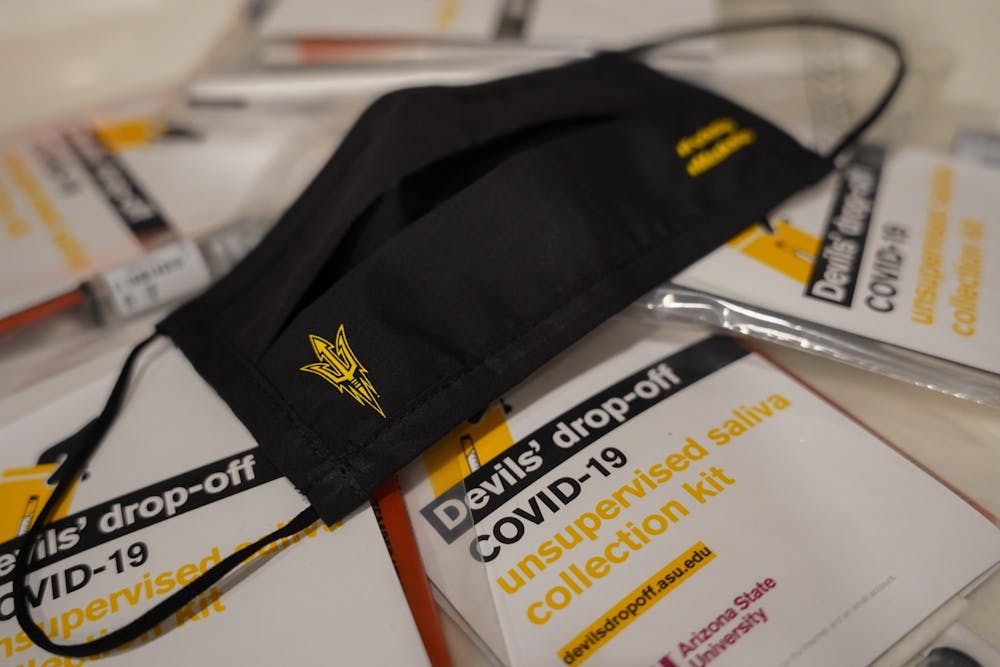Although the University's lack of communication about COVID-19 at the beginning of this semester makes it seem like a concern of the past, ASU should still actively inform students about its health risks.
COVID cases are on the rise. The Arizona Department of Health Services reported 3,381 new cases on Aug. 20 from the preceding week, with new infections per week more than doubling since July 2.
Remnants of the virus clearly run rampant. However, the University communicates sparsely about it.
ASU has yet to return to weekly COVID campus reports since the start of the fall semester. The University's latest statement dates back to July 17, 2023. The website also fails to provide campus-specific COVID numbers.
According to Natalia Stifano, program coordinator at Barrett, The Honors College, the University only sent one email at the start of the semester about COVID guidelines to staff members.
"At least in the communication that the staff receives from ASU… we don’t get it very often, it’s usually like at the start of every semester, where we just kind of get reminded of the CDC recommendations… at this time, that seems to be what ASU chooses to follow," Stifano said.
Yet, with the amount of emails staff and students receive per week, this communication can easily go unread. The COVID-19 notice is also not reflected in the University’s social media accounts and classroom buildings, severely limiting its potential reach.
This year, posters promoting COVID awareness noticeably decreased around campus. This lack of communication implies to students that the University is ready to move on from the pandemic. Replacing ASU's previously widespread COVID testing reminders with a measly email sent to already overflowing inboxes won't help students prioritize their health and their community's wellbeing.
"In terms of programming, there is no ASU COVID policy in place," Stifano said.
With ASU returning to pre-pandemic protocols, the threat of the virus has seemingly faded into the background.
“ASU dropping the whole COVID safety precautions safety out of nowhere reinforces the idea that many corporations and/or universities… (are) saving face in public until they don’t need to anymore,” said Stylé Ranger, a graduate student at the Thunderbird School of Management majoring in global management.
In contrast to ASU's somewhat timid approach to navigating COVID this school year, other universities have made it more explicit. For instance, Harvard College kept its “isolate-in-place policy” where students exposed to the virus quarantine in specially assigned suites. In addition, Harvard encourages students to have "a conversation" with roommates in order to plan for what to do in case of potential infections.
ASU’s notice, however, only meekly suggests that students follow self-isolation "per CDC recommended steps" rather than having a clearly stated requirement.
Additionally, ASU does not actively promote its COVID resources on social media or its website, despite the fact that ASU provides free COVID testing through Devil’s Drop-Off and COVID vaccine shots and boosters for both its staff and students.
Dr. Rizwana Biviji, a professor specializing in reducing healthcare disparities at the College of Health Solutions, suggested ways for the University to help students prioritize COVID resistance. Biviji said the University could be “promoting (the resources) even more, encouraging students that these are the resources, get tested often, maybe assigning some incentives too. Promoting that ... a little bit more so that students are aware."
ASU's lack of action could directly harm students, particularly those who are immunocompromised.
When exposed to COVID, Emma Horton, a sophomore studying global studies, can experience intensified Crohn's disease symptoms. Lack of awareness increases her infection risk.
"(COVID) also causes a Crohn’s flare-up,” Horton said. “My body’s already fighting so hard that when you introduce another virus it doesn’t fare very well for myself.”
Just because cases are going down doesn’t mean that the virus is completely gone. In fact, a new variant has already been reported and could be a threat if ASU doesn't help safeguard its students, particularly immunocompromised ones, highlighting the need for properly promoted health awareness.
While COVID is still around, ASU's protocols should be, too.
Edited by Mia Osmonbekov, Sadie Buggle and Angelina Steel
Reach the columnist at yonayan@asu.edu and follow @youla_onayan on X.
Editor's note: The opinions presented in this column are the author's and do not imply any endorsement from The State Press or its editors.
The University was contacted regarding this column. The State Press did not receive a response by publishing time.
Want to join the conversation? Send an email to opiniondesk.statepress@gmail.com. Keep letters under 500 words and be sure to include your university affiliation. Anonymity will not be granted.
Like The State Press on Facebook and follow @statepress on X.




